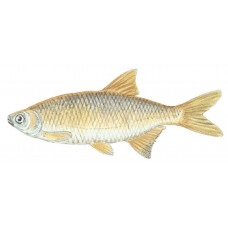Latin name
Notemigonus crysoleucas
Other names
Roach, shad roach, shiner, pond shiner.
Identification
The golden shiner has a deep, compressed body that is usually a golden yellow or brassy color in murky water, becoming more silvery in clear water. Fins are yellow-green, but reddish in large spawning adults. The mouth is small and upturned, the snout is slightly pointed, and a characteristic fleshy, unscaled keel runs along the belly from the pelvic to the anal fin. The dusky lateral line dips distinctly down the middle of the body, and the caudal fin is moderately forked. The coloration of the fins is more pronounced during the breeding season. The breeding male has small tubercles on the dorsal surface of the head and body. The goldfin has 7 to 9 dorsal rays and 8 to 19 anal rays.
Distribution
This species is widely distributed east of the Rocky Mountains in the central and eastern United States, from Quebec to Saskatchewan in the north and Florida, Texas, and Mexico in the south. It has been introduced into other states, including Arizona, California, and Washington.
Habitat
Slow-water fish, common in lakes, ponds, backwaters and slow-moving sections of streams, small and medium-sized rivers. They are often found in weedy, clear, still and shallow waters.
Size
Golden shiners can grow to 101⁄2 to 12 inches in length, although the average size varies depending on the environment. Smaller fish, 3 to 5 inches, are found in northern waters. These fish can live up to 10 years.
Life history and Behavior
Golden shiners reach sexual maturity in their second year, when they are usually 21⁄2 to 31⁄2 inches long, and spawn over a long period beginning in the spring when water temperatures exceed 68°F. They do not prepare nests like many other shiners and minnows, but scatter gummy eggs over algae and other aquatic vegetation and show no parental care.
Food and feeding habits
Golden shiners feed on plankton, algae, insects and small fish. They feed in the middle layers of the water, at or near the surface.
Reproduction
No information
| Classification | |
| Phylum | Chordata |
| Class | Actinopterygii |
| Squad | Cypriniformes |
| Family | Cyprinidae |
| Genus | Notemigonus |
| Species | N. crysoleucas |
| Features | |
| Conservation status | Least Concern |
| Habitat | Pelagic |
| Life span, years | 10 |
| Maximum body weight, kg | No information |
| Maximum length, cm | 30 |
| Sailing speed, m/s | No information |
| Threat to people | Edible |
| Way of eating | Predator |


